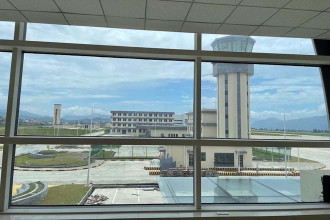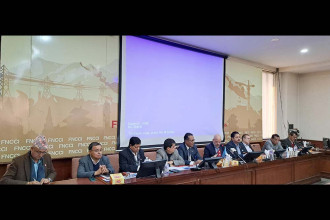-1732437745.jpeg)
KATHMANDU: A study has shown that increasing capital expenditure is challenging without policy and institutional reforms.
The Confederation of Nepalese Industries (CNI) and the Society of Economic Journalists-Nepal (SEJON) conducted a study on the quarterly status of budget implementation for the current fiscal year. The study found that allocated budgets have not been utilised due to the non-implementation of reform programmes, impacting the infrastructure construction sector.
The report highlighted that the budget allocated to the infrastructure sector has not been implemented due to inadequate planning, lack of government ownership, and failure to implement specified reform programmes.
At a programme titled 'Budget and Infrastructure Development' organised by CNI in Lalitpur on Friday, the National Planning Commission (NPC) stated that Rs 2,000 billion should be invested annually in the infrastructure sector under the 16th five-year plan. However, only about Rs 300 billion is allocated annually, and only around 60% of this budget was spent in the previous fiscal years.
The study included seven infrastructure-related points in the current fiscal year's budget, as detailed in the CNI's Budget Watch booklet. Only one point has been partially implemented, four points have seen partial progress, and two points have seen no progress.
-1732437746.jpeg)
NPC Vice-Chairman Shiva Raj Adhikari stated that discussions are ongoing with all ministries to reduce obstacles and improve coordination to increase capital expenditure. He emphasised the need for advance preparation of the budget list and rigorous evaluation of plans and resources, focusing on completing under-construction projects rather than adding new ones.
During a group discussion, Investment Board Nepal (IBN) CEO Sushil Gyawali mentioned that the 16th plan identifies a need for Rs 11.2 trillion in infrastructure investment, with Rs 3,500 billion from the government and the rest from the private sector. He noted that ambiguity in the federal system has hindered progress in infrastructure development.
Gyawali claimed that the current government is working on institutional reforms and paying special attention to achieving project progress by coordinating to remove obstacles. He stressed the importance of thorough project preparation, including financial management, detailed project reports, local ownership, and procurement management. Efforts are also being made to prioritise non-energy projects and develop financial mechanisms for infrastructure investment returns.
Ministry of Physical Infrastructure and Transport (MoPIT) Joint Secretary Krishna Pant highlighted issues with project implementation due to inadequate budgets. He mentioned that capital expenditure has slowed due to public procurement reform delays and pointed out a shortage of construction materials.
CNI Vice President Birendra Raj Pandey emphasised the need for policy and implementation improvements in the infrastructure sector. He recommended implementing financial instruments such as green bonds and infrastructure bonds to raise investment. He also highlighted the importance of technical, legal, and financial preparations for increasing capital expenditure.
Kishor Thapa, moderator of the group discussion, stressed the need for consensus among stakeholders for institutional and policy reforms, increased private sector participation, and clear decision-making capacity.
-1732437746.jpeg)
-1732437747.jpeg)
CNI President Rajesh Kumar Agrawal stated that an active infrastructure sector is essential for a dynamic economy and urged the government to ensure that allocated budgets are fully utilised. SEJON President Sujan Oli presented the status of infrastructure budget implementation at the event.






